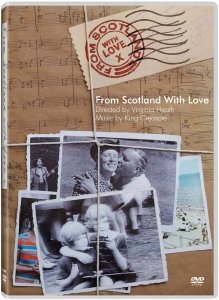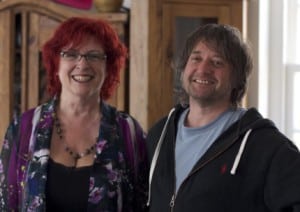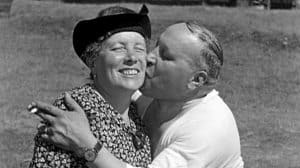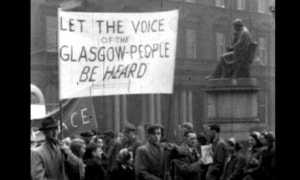From Scotland To New Zealand With Love (Interview)
Originally produced to coincide with the 2014 Commonwealth Games held in Glasgow, From Scotland With Love has taken on a life of its own. The film was directed by ex-pat Kiwi Virginia Heath who combed through hundreds of hours of archival Scottish film footage, dating back a hundred years to come up with a mesmerizingly beautiful look a Scottish life over the past century. The 75 minute film contains no narration or interviews. Instead Heath commissioned Scottish musician King Creosote (Kenny Anderson) to compose a series of songs to accompanying her images. The 13th Floor’s Marty Duda spoke with Virginia Heath who is Auckland to attend the screening of From Scotland With Love at this year’s International Film Festival.
Click her to listen to the interview with Virginia Heath:
Or read a transcription of the interview here:
MD: Before we start talking about the film itself, I just wanted to give you a chance to tell people…you are a Kiwi and a little bit about yourself and your New Zealand background and how you got to be making films.
VH: Well, I basically was born and bred in New Zealand but I actually didn’t start making films until I went to the UK because basically I studied history in New Zealand but that obviously gives me a background in terms of the ‘From Scotland with Love’ film.
I studied history at Victoria University in Wellington but then I sort of knew that I wanted to get into film. When I went to the UK I managed to get myself a place studying at St Martins School of Art in London and that sort of started me off in film. And at the same time, Channel 4 was launching…it was a very exciting period in television at that time because Channel 4 was really quite a different kind of television channel so there was a lot of opportunities for newbies to get in and start editing and directing and making interesting programmes.
MD: So what year would that of been in?
 VH: I started as an editor and then I progressed to directing documentaries, a series called ‘Rear Window’ which was actually the commissioning editor for that was Harrick Alley kind of well-known radical, I mean an artist and he’s a writer and a very educated guy. So he managed to get a slot doing documentaries about sort of Third World, oblique angles on art projects and so I got to make things like the first black African painter to paint on canvas in South Africa, but it was also sort of a reflection on somebody who was exiled in Paris. I got to make a film about a Turkish painter as the Berlin Wall came down looking at the city from the Turkish angle. All sorts of things like that which were really things that would never get made now.
VH: I started as an editor and then I progressed to directing documentaries, a series called ‘Rear Window’ which was actually the commissioning editor for that was Harrick Alley kind of well-known radical, I mean an artist and he’s a writer and a very educated guy. So he managed to get a slot doing documentaries about sort of Third World, oblique angles on art projects and so I got to make things like the first black African painter to paint on canvas in South Africa, but it was also sort of a reflection on somebody who was exiled in Paris. I got to make a film about a Turkish painter as the Berlin Wall came down looking at the city from the Turkish angle. All sorts of things like that which were really things that would never get made now.
MD: So what year did you go over to the UK from New Zealand?
VH: In the 80’s.
MD: It all sounds like that prepared you for doing From Scotland With Love because it all sounds like it deals with archival material and historical stuff. How did the project come to you initially?
VH: The project came to me because 2014 was quite a big year for Scotland. They had the Commonwealth Games there and also the referendum year, so there was a call for cultural projects to be made along side the games and we pitched the idea of doing a film, sort of feature length poetic documentary film, using the Scottish archive footage from the Scottish screen archives and we wanted to pitch it as a collaboration between me as the director and a Scottish composer. We settled on King Creosate (Kenny Anderson) because we were so impressed by his lyrical ability and just felt like he really kind of helped tell the stories I wanted to tell from the film through his lyrics and he’s also a wonderful melody writer as well. So he composed the original soundtrack for the film very much in a collaborative process with me finding the images.
MD: Was it always going to be with no narration or interviews? Was it always going to be just a music and image kind of thing?
VH: Yeah, we really wanted it to be quite open in the sense of the poetic reflection on Twentieth Century experience. We wanted space for the audience to think about the past and in relation to life today. There have been films in the past that have used no narration and we’d seen some of those and we just thought it would be a really great approach to the subject. Because I work in both documentaries and fiction, I was also confident that I could tell a story that could hold an audience for 75 minutes.
MD: Especially with a lot of the older footage it gives the film almost a dream like quality about it at some points.
VH: Exactly, exactly. I was looking up some quotes that directors of film and music and a lot of directors talk about film as music and film as dream, that sort of juxtaposition of the two things and I think that was very much an inspiration. It was the idea was that in such an important year, the Scots were really examining their identity and who they were as people and where they wanted to go. We didn’t want to make a political film but we wanted to make a film that would provoke thought I suppose and give people a base to think. Because quite often narration is telling you what to think then you don’t have that same space.
MD: If you’re asking folks about song writing, a lot of people want to know what came first, the words or the music? With this film I think it’s similar to that except, what came first the pictures or the music? I get the feeling it may have changed depending on the particular segments that you were working on.

VH: Yeah, it was very much a iterative process, backwards and forwards between me and King Creosate and the musicians he chose to work with including a brilliant string arranger and all sort of other fantastic musicians. For example, I would show him snippets of footage like kids dancing on the beach and he’d say, “Great! That gives me the idea for a jazz rhythm for that song,” or a skipping sequence made him think of his Grandma’s skipping rhyme book so doing something with that. The opening sequence of the film he wrote this beautiful song, Something To Believe In which was obviously very emotive and evocative, kind of opening to the film and ending to the film, especially in a year like 2014.
MD: It almost feels like you’ve got everyone who has ever lived in Scotland in the film.
VH: It’s funny, I was talking to someone, I was talking to Robyn Malcolm actually and she was saying the she and Peter Mullan had watched the film and they had been talking about how brilliant ordinary people are as actors. You know when you watch ordinary people on screen and that’s something we really tried to do, bring out characters in the footage, they are just fantastic actors. They are so authentic and genuine that they are really powerful on screen. They would never think of themselves as actors, that’s the thing.
MD: I got to figure the other collaborative effort is between you and your film editor who’s name is Colin Monie.
 VH: He’s an incredible actor, he is actually is one of the top editor’s in Scotland, if not the top. He’s edited all of Peter Mullan’s films, Orphans, The Magdalen Sisters, the whole canon I think, plus a lot of documentaries, he does a real mix of fiction and documentary. He was passionate about the film and working on it. It was great to work with somebody who actually lives there. I obviously live in Scotland now but I wasn’t born and bred there so it was important for me to have somebody like him, as well as the musicians who were all Scottish of course.
VH: He’s an incredible actor, he is actually is one of the top editor’s in Scotland, if not the top. He’s edited all of Peter Mullan’s films, Orphans, The Magdalen Sisters, the whole canon I think, plus a lot of documentaries, he does a real mix of fiction and documentary. He was passionate about the film and working on it. It was great to work with somebody who actually lives there. I obviously live in Scotland now but I wasn’t born and bred there so it was important for me to have somebody like him, as well as the musicians who were all Scottish of course.
MD: What kind of discussions did you have with him as an editor? Did you give him the music and the images and let him go at it or did you have very specific things in mind and that you wanted to have happen?
VH: I had very specific things in mind in the sense that I wanted to take a thematic approach to the project. I mean you probably know it was a mixed up time in periods. I’ve very much gone for themes. The overall theme of the film I would say is love and loss and there are themes of work and play, and leisure. The big theme of war, which affected Scotland hugely, sometimes whole communities, young men, gone, emigration, of course, then the whole thing of fighting for justice which is obviously a big part of the Scottish tradition. So I wanted those themes to carry the film through rather than it starting in 1900 and ending in 1970. The reason being, we decided to end at the end of the 70’s is I really wanted it to be an analogue film, all material originated on celluloid. Also we wanted to have a distance between now and the period the film covers because we wanted that sort of reflection back on the non-digital age where people lived much more I think, in communities, people worked unbelievably hard together, much more than they do today. People all went out, all went out on the same night, everyone went on holiday together, the whole way of life which I think is very different from today. I think its interesting to think about that, the think what we have gained and what we have lost.
 MD: Were you discovering more footage during the process of putting the film together or did you have everything that you were going to use before you actually started assembling the film?
MD: Were you discovering more footage during the process of putting the film together or did you have everything that you were going to use before you actually started assembling the film?
VH: We spent three months in the edit and during that time I would start to show Kenny (Anderson) bits and pieces that I absolutely knew…there are certain things you see and you just think, ‘OK, that’s got to be in the film somewhere.’
We had most of it and once we had done that three months of editing then I sat down and wrote a kind of treatment for the film which I broke down into 23 sequences I think, given that the length of the film is around 75 minutes.
Although I knew they wouldn’t all be songs and then I knew what I wanted to happen in each sequence and that’s pretty much is what the film is…quite remarkable when I look back at it. So,obviously that gave Colin and Kenny, King Creosate, a real guide as to what the film was going to be. Then of course they contributed hugely in terms of the actual nitty gritty of how it all went together. I’m pretty much a hands on director, I don’t just abandon the cutting room, I’m very much there all the time.
MD: This was produced in conjunction with the Commonwealth Games last year. Did you expect the film to have a life after that though, like it has had?
VH: We hoped it would, obviously it’s very rooted in Scottish experience but we really wanted to bring out universal themes that we felt people could relate to, beyond Scotland and it’s proving to the case. Obviously we are showing here in the New Zealand film festival and we we’ve actually shown in Argentina in the Buenos Aires International film festival. We’re going to be showing in Vancouver in Canada which we are hoping it will help launch the film over there. There is interest in Germany, France. I think we’ve managed to create a film that is on the one hand very much authentic to Scotland but also has themes I think that resonate beyond Scotland.
Click here for more info about From Scotland With Love screening at the NZIFF.
- Challengers – Dir: Luca Guadagnino (Film Review) - April 24, 2024
- Civil War – Dir: Alex Garland (Film Review) - April 9, 2024
- Pearl Jam – Dark Matter (Monkeywrench/Republic) Album Review - April 1, 2024
